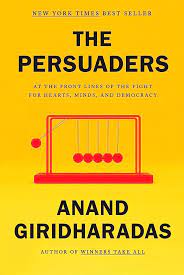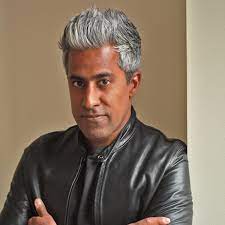Persuasion is a lost art. Persuasion means we respect the dignity and value of people we disagree with. Persuasion, if it is honest, means we ourselves are open to new ideas, new information, and are willing to adjust our previous conclusions. Persuasion is a win-win for us and society. And, sadly, we see too little of it in a world that favors screaming at and insulting opponents.
For that reason, I was looking forward to Anand Giridharadas’s The Persuaders. And I got a little of that, but not as much as I hoped. If you are looking for a balanced book that considers what we could learn positively from both right and left—you won’t find it here.
 Instead The Persuaders reports on some of the different approaches left-leaning strategists, activists, and legislators have been using recently to shift the thinking of voters. Each chapter focuses on one or two key people, such as Bernie Sanders, Alexandria Ocasio-Cortez, and others. And we find some interesting approaches described which depart from less than successful practices of the past.
Instead The Persuaders reports on some of the different approaches left-leaning strategists, activists, and legislators have been using recently to shift the thinking of voters. Each chapter focuses on one or two key people, such as Bernie Sanders, Alexandria Ocasio-Cortez, and others. And we find some interesting approaches described which depart from less than successful practices of the past.
The book is strong on reporting but is weak on analysis. As a journalist, Giridharadas largely chronicles the work, words, and methods of public figures he admires. He doesn’t offer much insight. I appreciate books that tell stories to illustrate their content. Narratives help drive home in concrete ways what can be abstract principles. But this book does the reverse—it illustrates stories with a smattering of principles. And that is usually much less effective because the point can get lost in the midst of a long tale.
 Often I am annoyed by reviews that say, I don’t like this book because the author didn’t write it the way I would have. And there may be some of that in my critique. But the book could have been so much better (more persuasive?) if the author had taken longer to write it, thought more deeply about the nature of persuasion, and guided us more concretely on how the character of our national discussions needs to change to preserve and enhance civility and democracy.
Often I am annoyed by reviews that say, I don’t like this book because the author didn’t write it the way I would have. And there may be some of that in my critique. But the book could have been so much better (more persuasive?) if the author had taken longer to write it, thought more deeply about the nature of persuasion, and guided us more concretely on how the character of our national discussions needs to change to preserve and enhance civility and democracy.
I am sympathetic to many of the viewpoints he highlights. I know the author wants us to be better, wants the American dream to be accessible to more and more Americans rather than fewer and fewer. But he might have included more thoughtful synthesis and a wider range of voices who all want us all to move forward together.
Having said all that, two chapters are particularly worthwhile, and I’ll talk about those more in my next Andy Unedited.

One thought on “A Lost Art”